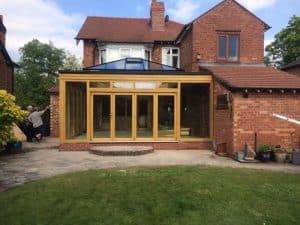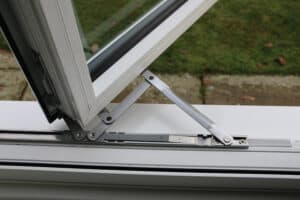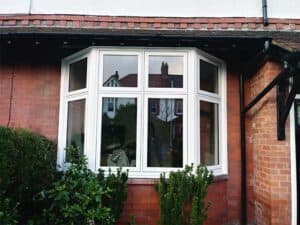A Guide to Popular Window Types for Your Home
Windows are more than just panes of glass shielding us from the elements; they’re the eyes of a home, offering...
Read MoreLast Updated: 28 September 2023
As a country, we’re starting to look for ways to create a more sustainable future. Our focus is on ensuring our home improvement projects are as sustainable as possible.
Timber is a renewable resource which is why many people see it as such a sustainable home improvement material. At Reddish, we have explored how sustainable timber is as a home improvement compared to other home improvement materials.
Although timber windows and doors are considered a high maintenance home improvement, they’re actually very simple to look after. Simply wash the timber panels or frames with a very mild detergent, warm water and a nonabrasive cloth. We suggest doing this at least once a year in the summer. Avoid using harsh chemicals on or near timber as this will cause damage.
Unlike other materials, timber will need re-coating after several years. The coating acts as a barrier to protect the timber, so don’t wait until you can see flaking and chipping in the frames before re-coating. Always speak to your installer about the longevity and type of finish your timber products have after installation. They’ll be able to advise you on the best course of action for protecting your home improvement.
When properly cared for certain timber windows can last for up to 50 years, although this can be less especially when living in a coastal area due to the constant exposure to the elements.
When you’re looking to purchase a timber home improvement product, you’ll be able to choose the timber you’d like. You’ll be offered two types of timber, hardwood and softwood; both have their own benefits for your home and for the environment.
Hardwood is often seen as a luxury home improvement material and is derived from trees such as Oak and Mahogany. The internal structure of hardwood is what makes it so stable whilst providing such incredible durability. A hardwood home improvement would need less maintenance, often leading to it lasting much longer.
Although hardwood is a renewable resource it isn’t considered the most sustainable type of timber. Some hardwood varieties can take up to 100 years to grow, this means that even if one tree is planted every time one is cut down, it would take a century for that tree to replace the previous one.
Softwood is by far the most widely used type of timber across the world. In fact, around 80% of the world’s timber is sourced from softwood trees. Pine and Spruce are the most commonly used softwood varieties, characterised by their exceptional growth rate. It is this growth rate that makes softwood one of the most sustainable products in the world.
Although softwoods are not considered as durable as their counterpart, they can easily be treated to strengthen them and extend their life. Making softwood an equal yet more sustainable option than hardwood.
Scientists have been developing techniques to improve the properties of timber. After eight decades of experimenting, they finally perfected Accoya wood. It has all the technical properties of timber, but they are exceptionally advanced.
Accoya wood is derived from a type of fast-growing pine wood sourced from Australia. Its fast growth makes it one of the most renewable resources available. Unlike other treated timber, Accoya is able to safely be recycled when it reaches the end of its use.

In order to manufacture Accoya, the Pine is put through an acetylation process. The process increases the quality of the wood to an unmatched level, by turning free hydroxyls in the wood into an acetyl group. The result is a beautiful timber material with exceptional technical properties.
Accoya wood has the ability to last for over 80 years when properly cared for. See our helpful cleaning guides to learn more about taking care of your Accoya home improvement products. It’s modified cell structure means paint and coatings are both easier to apply and need touching up less. You may have heard that timber windows and doors often experience shrinkage or swelling caused by temperature changes or constant exposure to adverse weather conditions. With Accoya you reduce the potential of this occurring by over 75%, keeping your seals tight to avoid draughts or long-term damage.
On some traditional home improvements, the timber would rot or develop fungi that would penetrate the material causing irreparable damage to the internal structure. As acetylation alters the entire cell structure of the Pine; the new structure cannot be identified as wood by those nasty fungi.
The process also makes the Accoya completely indigestible to insects, so any insects that attempt to eat the wood will actually die of starvation instead. This prolongs the lifespan of your product significantly.
Traditional timber has always been an excellent insulating material which is one of the features that boosted its popularity. Accoya outperforms other timber options, coming out as the best energy-efficient timber material. By having an Accoya home improvement product installed you will save money on your energy bills and keep your home comfortable all year. The lower your energy consumption is the better it is for the planet.
Timber is a renewable resource that is widely available across the globe but is it really the most sustainable home improvement material we could be using.
Unlike timber, aluminium is not a renewable resource as there is not an unlimited amount of it in the world. However, once aluminium has been created it can continuously be recycled and reused without losing any of its properties. Of all the aluminium ever produced, a massive 75% is still in use to this day.
As aluminium is incredibly low maintenance it is a very popular choice for commercial buildings and coastal properties. Considering its slim and lightweight appearance, aluminium remains to be one of the most durable materials available.

Aluminium is one of the most environmentally friendly materials available for home improvement products. The manufacturing process is a relatively green one as it uses much less energy than timber can. Timber manufacturing has a heavier energy consumption and involves cutting down trees which can lead to deforestation. At Reddish Joinery, we only use sustainably grown and sourced timber and as the demand for sustainable timber increases, more well-maintained sustainable forests will be developed.
Advancements in uPVC have caused the material to become not only a popular choice but a more sustainable one. Although it is considered a plastic it doesn’t have the same negative environmental effects. It isn’t just the design innovation of uPVC that has advanced, but the recycling process has improved so greatly that responsibly sourced and used uPVC is another incredibly sustainable building material.
Recycled uPVC home improvement products are slowly pushing their way into the market as customers and installers are realising not only the environmental value of using recycled material but the durability and quality of it.

Although uPVC is manufactured using some renewable resources it is definitely not renewable and will consistently need to be produced. uPVC can be recycled and repurposed but unlike aluminium there is a limit on how many times it can go through this process before needing to be retired. Once installed uPVC will last around 20 years, which is significantly less than treated timber and some aluminium. For these reasons, it is the least sustainable option out of the three but by no means is uPVC an unsustainable material.
Sustainable timber home improvements from Reddish Joinery
When you’re looking for a beautiful and sustainable home improvement product for your home, there really is no better choice than Accoya. No matter which Accoya home improvement product you’re looking at, Reddish Joinery are able to assist you. We’re a certified Accoya installer so you can be sure that you’re receiving the best knowledge and service possible.
For your free no-obligation quote give us a call on 0161 969 7474 or contact us online.
Windows are more than just panes of glass shielding us from the elements; they’re the eyes of a home, offering...
Read MoreIf you’ve noticed your window has become difficult to open or close there could be a number of problems going...
Read MoreWhen you’re living in a period property it can be difficult to find the balance between improving the efficiency of...
Read MoreWith energy bills continuing to soar, we’re all looking for ways we can conserve energy around our homes. When homeowners...
Read More